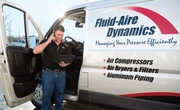When an air compressor fails, repair is usually the first option. In many cases, though, it is not the most practical choice. Spending repeatedly on an older unit that is likely to fail again can be costly, while replacing the air compressor requires a major investment. The decision depends on the compressor’s condition, the budget, and long-term operational needs.
How Do You Choose Between Replacing or Repairing a Compressor?
A compressor breakdown can halt production, cost you thousands in downtime, and leave you scrambling for a solution. The choice between repairing and replacing isn’t always obvious — it depends on your unit’s condition, reliability, efficiency, and the long-term costs.
When evaluating whether to repair or replace, consider the following pros and cons of air compressor replacement vs. repair:
| Criteria | Repair | Replace |
|---|---|---|
| Upfront Cost | Lower | Higher |
| Downtime | Minimal (if the issue is isolated) | Medium to long (depends on delivery/install)* |
| Reliability | Moderate — depends on condition | High — especially with new components |
| Future Operating Costs | Potentially rising (more repairs) | Lower for several years |
| Energy Efficiency | Varies by model; may be lower with older systems | Typically better with modern systems |
| Scalability | Limited to current specs | New unit can match evolving demand |
| ROI | Short-term savings | Long-term efficiency and cost control |
Once you've weighed the options, you’ll typically land in one of two camps — repair makes sense, or replacement is the smarter investment.
*Worried about downtime for air compressor replacement? Fluid-Aire Dynamics has short lead times and an efficient installation process. We can also offer air compressor rental to get you up and running immediately!
When to Repair an Air Compressor
Repairing an existing air compressor will almost always be less expensive than buying a new air compressor. Air compressor repair or service may be needed if:
- You notice oil leaking or excessive oil in the air lines.
- The compressor fails to start or fails to stop.
- You are experiencing tripped breakers or air compressor overheating.
- You notice air leaks in the compressor.
- You are experiencing pressure or flow problems.
- You have a broken hard-to-source compressor component.
If the unit performs well aside from the current issue, a targeted repair is often the fastest and most cost-effective solution.
Repairing may be the better option if:
- The compressor is relatively new or still under warranty.
- You have an extended warranty that will cover the repair.
- Parts are easily sourced and not too expensive.
- The unit is generally reliable, energy efficient and in good operating condition.
- The unit is able to keep up with your demand for air when it is working.
- You can find a qualified service technician who can fix the air compressor.
When to Replace an Air Compressor
Air compressor replacement will cost more up front, but sometimes a compressor change is the better decision in the long run. A new replacement air compressor can reduce your energy costs, improve compressor reliability and uptime, and help you prepare for future business needs.
A new air compressor may be in order if:
- Your existing compressor is nearing the end of its service life.
- It's been generally unreliable and needs frequent repairs.
- Your business depends on 100% uptime, and the current compressor can’t deliver.
- The air compressor is outdated, with hard-to-find parts and fewer techs available.
- The system is not energy efficient and causes high utility bills.
- The compressor can’t meet current or anticipated demand.
- You're eligible for energy incentives such as ComEd, Focus on Energy, or Xcel.
A new system with better sizing and modern controls (like VSD) can significantly reduce total ownership costs.
Making the Right Decision About Your Compressed Air System
Smart business owners don't make repair-or-replace decisions on impulse. Instead, they systematically evaluate key factors to determine the most cost-effective path forward for their compressed air system. Many variables come into play, but there are three key factors in the replace-or-repair decision:
- Compressor age: Units under warranty or less than 10 years old are more likely to be repairable.
- Usage history: Frequent breakdowns or capacity issues suggest a replacement might be smarter.
- Energy efficiency: Old fixed-speed compressors can account for up to 75% of total ownership cost through electricity.
The decision to replace or repair a compressor really comes down to a cost-benefit calculation.
Final Thoughts
Deciding between repair and replacement is like deciding whether to fix an aging car. Repairing is usually the first choice for manufacturers, but there comes a time when putting more money into repairs just doesn't make sense.
Need help deciding? Fluid-Aire Dynamics offers expert service, fast diagnostics, and full replacement solutions. We can even help you apply for rebates to reduce your upgrade costs.




